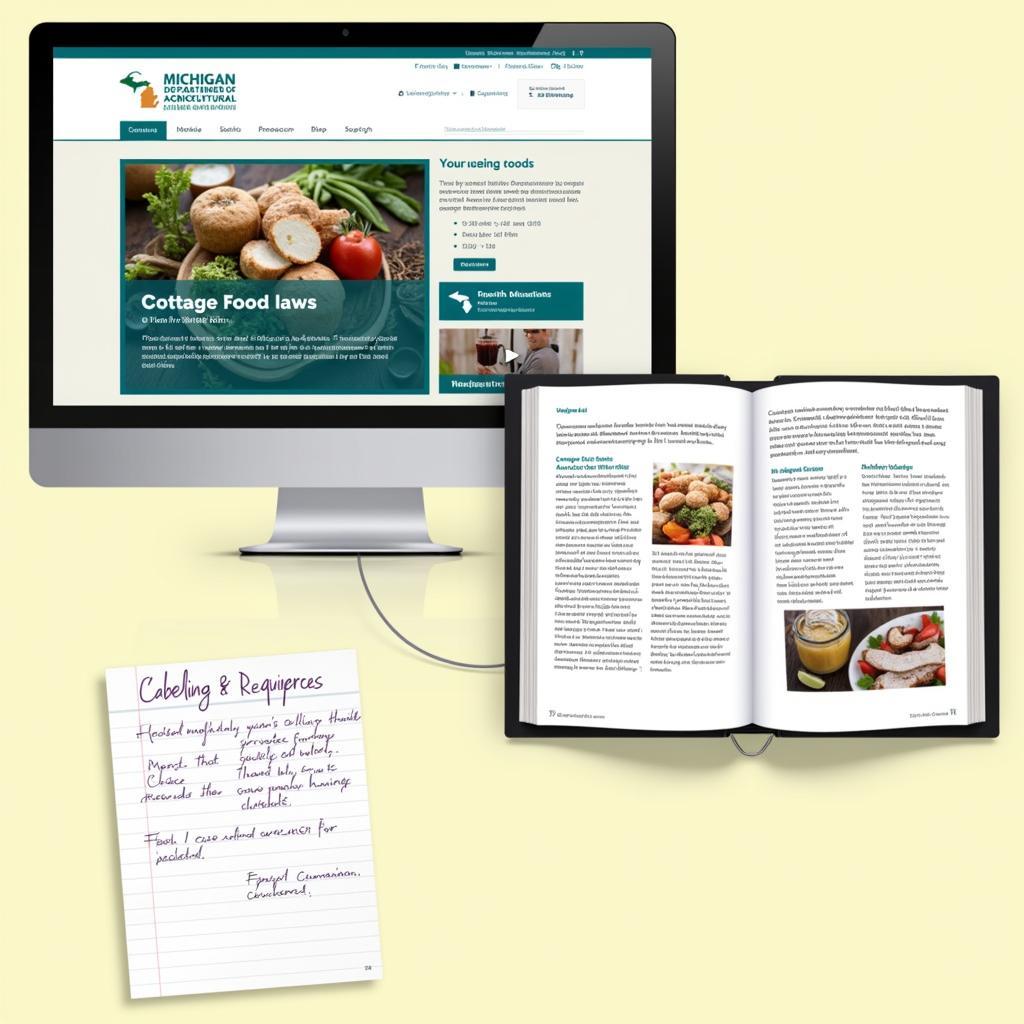The Michigan Cottage Food Law 2023 allows home-based food businesses to thrive while ensuring consumer safety. This comprehensive guide will delve into the intricacies of the law, helping you understand the requirements, permitted foods, labeling guidelines, and more. Whether you’re a seasoned cottage food entrepreneur or just starting out, this article provides valuable insights to navigate the legal landscape and build a successful home-based food business in Michigan.
Understanding the Basics of the Michigan Cottage Food Law
The Michigan Cottage Food Law provides a framework for individuals to legally sell certain homemade food products directly to consumers. This law exempts these small-scale operations from the rigorous licensing and inspection requirements of commercial food establishments. However, it’s crucial to understand that specific regulations must be adhered to. This ensures both the safety of your customers and the legality of your operation.
What Foods are Permitted Under the Law?
The law allows for the sale of “non-potentially hazardous” foods. These are foods that don’t require refrigeration to prevent the growth of harmful bacteria. Examples include baked goods like breads, cookies, and cakes, jams and jellies, dry mixes, certain candies, and dried spices. Foods requiring refrigeration, such as meat products, dairy products (excluding some cheeses), and custards, are generally prohibited.
Labeling Requirements: What You Need to Know
Proper labeling is a vital aspect of the Michigan Cottage Food Law. Labels must clearly state the name and address of your cottage food operation, the name of the food product, all ingredients listed in descending order of predominance by weight, the weight or net volume of the product, and allergen information according to federal labeling guidelines. Crucially, your label must also include this statement: “Made in a home kitchen that is not subject to state licensure and inspection.” This transparency is essential for informing consumers about the nature of your business.
Selling Your Cottage Food Products: Where and How
The Michigan Cottage Food Law dictates where you can sell your products. Direct sales to consumers are allowed at farmers markets, roadside stands, and from your home. Selling wholesale or through retail stores is generally prohibited. Online sales are a gray area and require careful consideration of the law’s interpretation regarding direct-to-consumer sales.
What are the Registration Requirements?
While licensing is not required, registration with your local health department is recommended. This voluntary registration demonstrates your commitment to food safety and can build trust with your customers. It also provides an opportunity to connect with local health officials and stay informed about any updates or changes to the law.
Scaling Your Cottage Food Business While Staying Compliant
As your cottage food business grows, it’s essential to remain informed about the legal limitations. The law sets an annual gross sales limit, and exceeding this threshold requires transitioning to a licensed food establishment. Understanding these limits is crucial for planning the future growth and scalability of your business.
What are the Penalties for Non-Compliance?
Failing to comply with the Michigan Cottage Food Law can lead to penalties, including fines and the potential shutdown of your business. Staying informed and adhering to the regulations safeguards both your business and your customers.
 Resources for Michigan Cottage Food Businesses
Resources for Michigan Cottage Food Businesses
Conclusion: Thriving Under the Michigan Cottage Food Law 2023
The Michigan Cottage Food Law 2023 offers a fantastic opportunity for passionate food entrepreneurs to share their creations. By understanding the nuances of the law and adhering to the guidelines, you can build a successful and fulfilling home-based food business.
FAQ
- What is the annual gross sales limit for a Michigan cottage food operation?
- Can I sell cottage food products online?
- What are the labeling requirements for cottage foods in Michigan?
- Where can I sell my cottage food products legally?
- Do I need to register my cottage food operation?
- What are the penalties for violating the Michigan Cottage Food Law?
- Where can I find more information about the Michigan Cottage Food Law?
For further assistance, contact us at Phone Number: 02437655121, Email: minacones@gmail.com or visit our address: 3PGH+8R9, ĐT70A, thôn Trung, Bắc Từ Liêm, Hà Nội, Việt Nam. We have a 24/7 customer service team.